Tales of a 21st Century Gypsy
May 2, 2004. In the neighborhood.
| Biking back to my house one night, I circled through my neighborhood feeling the warm sweet smells of the spring. Flowers are blooming everywhere, azaleas and wisteria, tall proud tulips, lavender hyacinths, early roses. In the darkness the smells of cut grass and perfume are heavy in the moist air. The streets are quiet and restful. Lights shine inside the houses as I ride past, aimlessly turning corners and spinning around blocks enjoying the calm. One house has a party on their porch, the hum of talk and the lights of candles on small tables flitter like a gathering of fireflies. | ||||
| On the weekend the community came out for the annual Columbia Pike Blues Festival. I donít much like the blues, but I do like neighborhood parties. This one filled a wide street, blocked off with barricades and police cars. The stage was at one end, caterers sold barbecued ribs and eggrolls and Thai noodles at the other. Between them people handed out fliers and campaign buttons, collected neighborhood association dues, gave away crimson and gold and orange and blue frisbees advertising a home remodeling firm, and sold pottery, earrings, and trinkets from Nepal. The sun was strong, and the snow-cone truck was doing a brisk business as children chose between coconut, blue raspberry, pineapple, and other exotic flavors. | ||||
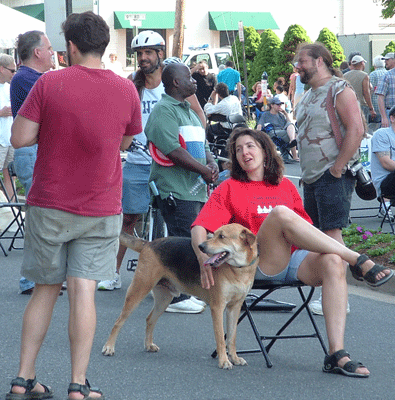 |
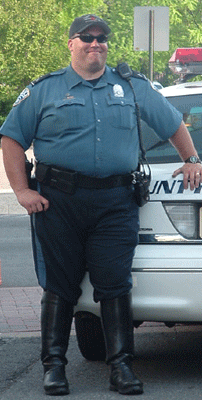 |
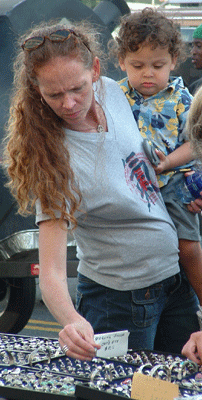 |
||
|
Arlington festivals are for the Arlingtonians. Not for us the chaos of the mall on the Fourth of July, the great huge parties for the whole country, the huge fireworks displays that the federal government stages every year. Our festivals are modest events where we hope to run into our neighbors, we chat with the same cops we saw there last year and the year before, we run into county board members, we find out how to get composting bins or where to donate the old bikes languishing unridden in our garages. | ||||
| Down the by the stage, folding chairs were scattered on the street for those who want to settle in and listen. Families spread out on the grass nearby, folks sat in the shade on the steps of a small office building. People listened, chatted, milled around, ran after toddlers and dogs. One woman had a cat on a leash, hiding in the crook of her arm at sudden noises. Up in the front a dozen children danced. A plump olive-skinned girl of eleven or so, in a dowdy calf-length flowered dress and slippers, led the group, leaping and bouncing, shaking her arms, tapping her feet. Several precocious children dressed like sex symbols before even reaching puberty followed her lead, copying the moves of this unselfconscious girl as she followed her own rhythm in the dance. | ||||
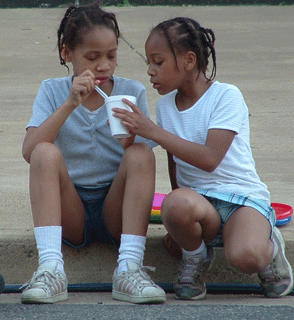 |
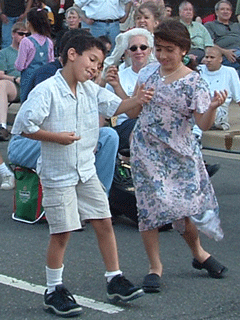 |
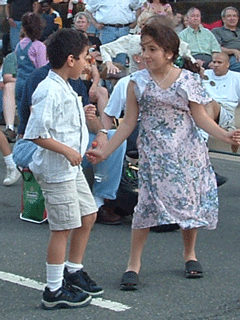 |
||
| In Alexandria, down the Potomac River from Arlington, is a sculpture garden, or memorial, or riverfront plaza, which defies description. Notwithstanding which, I will attempt to tell you about it forthwith. Imagine an ancient ruin Ė marble pillars, broken pieces of giant statues, great blocks of stone lying about, the remains of a Roman or Mycenaean amphitheater, a tall obelisk. Now imagine a 20th century re-creation of that ruin, tidied up, smoothed over, artistically placed in a garden of fountains and walkways and steps leading down to the river. In a pool at the top a mammoth eye watches you as you enter the garden. On a terrace overlooking the river a chunk of inscribed stone has Roman numerals and fragments of text, ďMEMOR.Ē On either side of the amphitheater steps, huge polished stone lips four feet wide are all that remain of a pair of giants, water trickling out of their mouths into slides and running down to a pool at the bottom of the stone seats. Two eyes are set in a wall, surveying the river and an obelisk that mimics the real Washington monument on the D.C. side of the Potomac. Itís all puns on antiquity, on the monuments of the city, on our own objectification of our past. And itís just a place to hang out Ė office workers are scattered on the steps and ledges eating lunch in the sun among the ruins. |
|
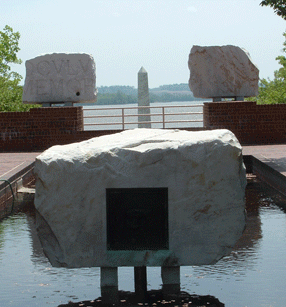
|
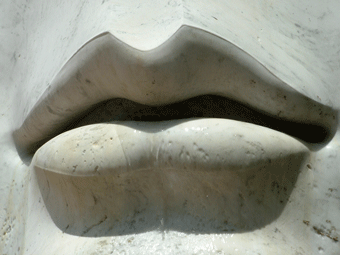 |
|
It was Marion who first brought me here, she lived a few blocks away. She made me a gift of this place, as I have given it to many people since. She enjoyed its wit, saw it as the pretentiously silly place that it is. She would enjoy what Iím doing now, too, my life as a gypsy. She had her own full life, but she also lived vicariously through me, visiting China and Nepal and Niger and Tunisia through the photos I brought back and the stories I told. She would have loved to follow Matilda and me in our exploration. It seems such a waste that she canít. We were supposed to share a house when I reached 97 and she 98, and we couldnít manage on our own any more. But she wimped out on me, and she doesnít get to see how the story will turn out. |
| I used to feel that when someone died it was as if there was suddenly a hole in the world in the spot they had filled. Then over time the hole closed up, filled in by other people, new activities, new ideas. But Marionís hole has reopened since I went on the road. I donít actually think sheís out there anywhere. But in case you are, Marion, Iíll dedicate my website to you. You loved the web, I hope you can read it still and come with me on my travels. | ||
Continue to the next entry.
Return home.
Unless otherwise marked, all text and photos on this site ©Joy E. Hecht.